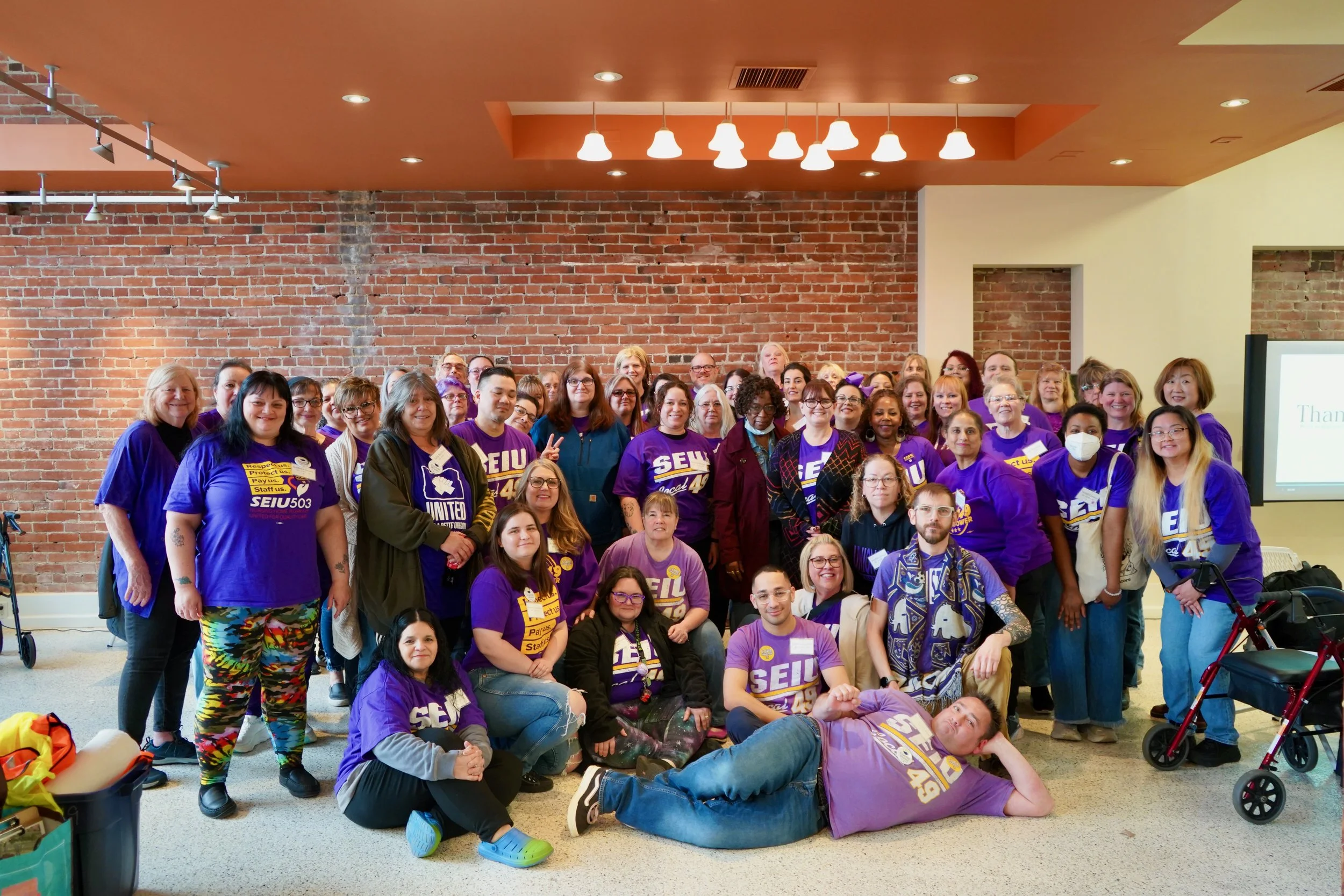2025 Legislative Session – SEIU Members Made a Difference
The 2025 legislative session ended with some major wins and a few misses for SEIU members in Oregon and Washington. Through the advocacy of our members, we were able to temporarily protect Medicaid funding, and pass legislation that strengthening workplace safety in hospitals, advanced consumer protections by ending the use of medical debt in credit reporting and getting corporations out of the practice of medicine. In Oregon and Washington, we passed legislation that will benefit all workers, including a bill to allow striking workers to collect unemployment insurance! Additionally, in Washington we passed legislation to cap rent increases at 7% including inflation. Washington joins Oregon in passing rent cap increases protecting tenants across the state.
You can learn more about bills that will impact you by scrolling down this page or jumping to the section you’re interested in. If you’d like to get involved (or more involved!) with our political program, the best way to start is by giving to COPE, our voluntary political action committee. COPE helps us win political victories for our members and our communities.
WORKER & UNION RIGHTS
This session saw strong solidarity across labor to win for working people and SEIU members joined together with workers from across sectors to support several important bills.
In Oregon and in Washington, we passed Unemployment Insurance for Striking Workers bills. Now Oregon workers who go on strike for longer than two weeks will have access to unemployment for up to 10 weeks, including public sector workers, making ours one of the strongest laws in the country. In Washington, workers who go on strike for 2 weeks minimum will have access to unemployment after 6 weeks. This applies to private sector workers and there are more provisions for public sector workers.
This was a top priority bill for our members and the AFL-CIO in OR and WA and a major victory for workers.
We also supported House Bill 3187 in Oregon, which passed this session. The bill bans requesting any age information on a job application to fight age discrimination. This effort coordinated by the AARP included testimony from several of our member leaders.
HEALTHCARE VICTORIES IN OREGON
Our top priorities were to preserve access to care for the 1.4 million Oregonians who rely on Medicaid and to protect the patients and caregivers who need and deliver the care. We achieved major victories including strengthening workplace safety in hospitals. We advanced our consumer protections by ending the use of medical debt in credit reporting.
Hospital workers secured key protections this session, winning legislation that improves safety on the job, strengthens financial protections for patients, and ensures greater accountability from healthcare providers.
OR House Bill 3243 – Ambulance Billing Protections: Prevents surprise balance billing for ambulance services and requires transparency in reimbursement, easing financial stress on patients and the hospital workers who advocate for them.
OR Senate Bill 537 – Workplace Violence Prevention: Defines workplace violence in hospitals, guarantees support for staff after incidents, and mandates panic buttons, prevention plans, and de-escalation training to keep hospital workers safe on the job.
Senate Bill 605 – Medical Debt & Financial Assistance: Prohibits credit reporting on medical debt passed. This bill helps defend workers' financial stability as federal protections weaken. Medical debt can wreck credit ratings making it harder to navigate finances.
House Bill 2010 – Funding for Oregon Health Plan: The legislature passed this bill in order to renew how it gets funding for the Oregon Health Plan despite the federal government passing a bill that will cut Medicaid funding. We are not in the clear and will need to continue monitoring this in order to ensure that we continue funding access to healthcare. In a major victory, $17 million was secured for the Essential Worker Health Trust in HB 5006, the 2025 budget bill. This funding supports health care benefits for essential workers in skilled nursing facilities and leverage workforce investments to stabilize and strengthen staffing in critical care settings.
Unfortunately, HB 3838 (Home and Community-based Care Workforce Standards Board), failed to pass despite being one of our Union’s top legislative priorities. This bill would create a statewide Workforce Standards Board for the long-term care industry, bringing workers, employers, and the state together to set standards for pay, training, and staffing. The goal is to improve working conditions, career opportunities, and the quality of care. Despite hundreds of members appearing at the Capitol and talking to their elected officials, opposition was stiff, and the bill didn’t pass this session. This fight is not over. Please stay in contact with your legislators and share your stories about providing needed services or friends and family who are using needed services.
AFFORDABLE & STABLE HOUSING
Housing access and affordability was one of the most critical issues in this session, notable for many of our members, especially communities of color. SEIU members fought for additional funding to address Oregon’s affordable housing crisis. Here are some of the major housing bills our members helped pass:
OR Senate Bill 599: Fair Housing for All Oregonians prohibits landlords from inquiring about or disclosing immigration status or rejecting an applicant due to immigration status.
OR House Bill 3054: Manufactured Home Park Rent Stabilization. This bill caps rent increases in mobile homes to 6% to protect homeowners living in parks who are experiencing rent increases and other requirements that far outstrip what they can afford with income from pensions, social security, or modest wages.
With a budget impacted by economic uncertainty at the federal level, lawmakers only provided $44 million out of the $173.2 million requested for homelessness prevention. The eviction prevention programs that lost funding have already proven effective in keeping thousands of Oregonians housed. Without continued funding for these critical safety-net services, the eviction crisis will deepen, pushing more families into crisis.
This lack of funding will put an estimated 20,000 households at risk of eviction. We will be doing work through the Stable Homes coalition during the interim to address this funding gap. We will continue to advocate for homelessness prevention funding.
The legislature also failed to pass SB 722, which would have reduced the exemption for rent affordability requirements on newly constructed housing from 15 years to 7 years. Our state is facing a housing crisis, and our members cannot afford to wait 15 years for newly constructed buildings to no longer be exempt from the rent stabilization policies that we’ve passed in this state. We are working with housing coalition members during the interim to create a strategic plan for the 2026 session so that this doesn’t happen to us again.
WA House Bill 1217: In Washington, we passed for the first time in the state’s history a rent cap for tenants. This bill will cap rents at 7% with inflation or up to 10% whichever is less.
No more than a flat annual increase of 5% can be applied to people who own homes in mobile home parks.
TRANSPORTATION IN OREGON
The Oregon Legislature ended its session without passing a transportation package, despite urgent warnings from ODOT about declining gas tax revenue and rising costs. Without new funding, ODOT faces around 500 layoffs, especially impacting rural, coastal, central, and southern Oregon. Services like snowplowing, road striping, and accident response will be cut. Gutting ODOT will reduce safety, maintenance, and accident response for all Oregonians.
As a union, this was more than just saving jobs, it’s about taking necessary steps to ensure that we have safe and reliable roads all across the state. This fight is not over, the Oregon Legislature is holding a special session to pass a transportation package that will fund the crisis that’s putting ODOT jobs at risk. Now it’s time to keep that momentum going by putting pressure on legislators to vote yes on saving jobs and to send a clear message: lawmakers must pass a real funding solution that protects every job and invests in the future of Oregon’s roads and infrastructure.
FAIR SHOT FOR ALL
The Fair Shot coalition continues to push a shared agenda that improves the lives of all Oregonians, regardless of race, geography, or background. This year’s agenda focused on protecting immigrant families, keeping Oregonians housed, strengthening behavioral health care, and giving essential workers a voice. The Fair Shot agenda for 2025 is here.
Important wins for Fair Shot this session included: funding for key parts of the immigrant justice package (including $15 million for Universal Legal Representation) and investments in safety for behavioral health workers. There is still unfinished business on the agenda that we and others will continue to fight for, including our workforce standards board bill and SB 611, Food for All Oregonians.
CLIMATE JUSTICE
This session, our Union worked with labor and environmental allies to advocate for legislation related to climate, community resilience, and emergency preparedness. The Governor also signed HB 2567 to make heat pumps more affordable. HB 3546, the POWER Act, requires data centers, cryptocurrency, and other large industrial energy users to pay for their share of electricity use and costs.
OUR WORK CONTINUES
This year’s legislative session proved what we already know: when working people stand together across race and place, we can make a difference. SEIU members defended Medicaid so families can get the care they need, made hospitals safer for patients and staff, stopped medical debt from wrecking credit scores, and pushed corporations out of the practice of medicine. We broke new ground by winning unemployment benefits for striking workers and securing rent caps that keep thousands of families from being priced out of their homes.
These victories weren’t handed to us. They happened because working people demanded them—and because we refused to be divided while billionaires and corporate politicians tried to take from us.
But our work isn’t done. Powerful interests fought hard to block the standards our families deserve, and they’ll keep fighting against us. The difference between what we win and what we lose is how strong we are together. By building our collective power, we can win the future our families deserve—safe workplaces, fair wages, stable housing, and dignity on the job.
Now is the time to grow our strength. Contribute to COPE, our voluntary political action fund, and help us keep fighting—and winning—for working families across Oregon and Washington. Because no matter our race, where we come from, or what we earn, our families come first—not billionaires, not corporate politicians.




